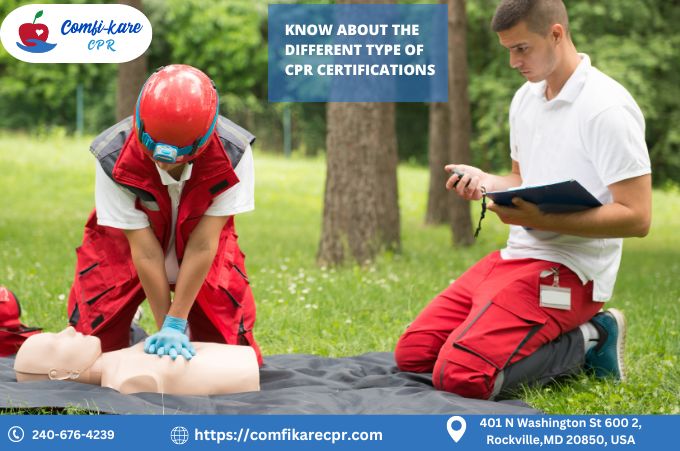
CPR is an essential life saving skill in situations such as cardiac arrest or drowning, with the process involving chest compressions, rescue breaths, and oxygenation to keep the blood circulating. Due to its importance, several organizations offer CPR certificates tailored specifically for specific audiences or needs – whether you’re a health professional or simply want to be prepared in case of emergencies. We will discuss various CPR certifications here so you can select the one best suited to your situation.
1. Basic Life Support Certification (BLS)
The most probable candidates for BLS certification are doctors, nurses and paramedics.
BLS certification is mandatory for healthcare personnel. The course covers a broad spectrum of subjects, including life-saving techniques like CPR, AED deployment, teamwork, and patient retrieval.
BLS courses include chest compressions and ventilation techniques to maintain blood circulation and oxygen supply until necessary for further care. Certification must include an AED device that can restore heart rhythm during cardiac arrest.
Validation for the BLS certificate is two years but must be completed in an approved course to renew.
2. Heartsaver CPR/AED Certification
This training is for non-healthcare workers such as educators, coaches and fitness instructors looking to prepare themselves in case an urgent situation arises.
What It Covers: Heartsaver CPR/AED Certification is ideal for individuals outside of healthcare who wish to learn CPR essentials, yet lack medical experience. This certification covers infant, child and adult CPR as well as AED use. The course has been created so it is easily understandable by anyone without prior medical background.
The Heartsaver Course equips participants to relieve choking. Choking is an emergency that can strike anytime; therefore this course is often attended by professionals working in public settings like schools, gyms, and community centers where emergency situations could potentially arise.
Validity: Certification in CPR/AED by Heartsaver lasts for two years from their issue date.
3. CPR Certification for Healthcare Providers
Who Is This Certification Intended For: Healthcare professionals requiring CPR skills as part of their jobs. This may include doctors, nurses, emergency medical technicians (EMTs), EMTs, or any other EMTs.
What It Covers: Though similar to BLS certification, CPR and First Aid for Healthcare Providers training may be presented separately depending on an organization. Training emphasizes skills required in medical environments including advanced CPR training, team-based efforts to resuscitate and management of airways management – making this course essential for healthcare workers likely to come across cardiac emergencies.
This course offers in-depth training in managing patient breathing, an essential skill in medical emergencies. Certification provides high-quality care to those suffering from a cardiac event.
Validity: Certifications typically last two years from their issue date.
4. Pediatric Advanced Life Support Certifications
Who Is This Course Suited For: This course has been tailored specifically for pediatricians and nurse practitioners working with young children.
Healthcare providers with PALS certification can now respond more rapidly in emergency situations involving children due to specific physical and psychological requirements.
PALS certification provides healthcare providers who specialize in children with advanced airway management techniques, pediatric medications and CPR – making this certification invaluable to children’s healthcare providers.
Validity of PALS Certifications: PALS certificates remain active for two years following their date of issuance.
5. Certificate in Advanced Cardiovascular Life Support.
Who Does This Certification Target? ICU nurses, cardiologists, and ISU nurses who are caring for patients with severe cardiovascular problems have access to the certification program.
The ACLS certification is intended for medical professionals who handle severe cardiac emergencies. Going beyond basic BLS skills, ACLS provides more advanced techniques like airway management and early recognition/treatment of cardiac arrest.
ACLS courses are intended to instruct healthcare providers on team dynamics, complex algorithms, and teamwork in cardiac emergencies. Certification from this course is necessary if working within emergency departments, intensive-care units, or any setting where such emergencies could arise.
Validity: ACLS certificates are valid for two years after they were issued, starting on their date of issuance.
6. Community CPR Certification
Who it’s for Anyone seeking basic CPR knowledge – such as parents, babysitters, or general public members.
What it Covers: The Community CPR Certification course is intended for non-medical laypeople interested in learning CPR. It offers basic training in CPR, AED use, and other emergency procedures – an ideal option for people wanting to be ready to assist an accident scene without needing additional medical training.
Learning and performing CPR can be made simpler if the course only focuses on chest compressions without using rescue breaths, like Community CPR course does. Furthermore, its simplicity ensures it’s easily accessible for everyone involved.
Validity: Community CPR certifications typically last two years.
7. First Aid and CPR Certification
Who it’s for: If anyone wants to understand the basics of CPR and first aid can go for this certification. People might include workplace responders, coaches, parents or even workplace first aiders.
Emergency response training and certification in CPR ensure that you are prepared to respond quickly. This course covers CPR for adults, children, and infants. You can also learn about basic first aid options such as burns, allergies, or cuts.
Participants will gain the skills needed to manage minor and moderate medical emergencies until professional assistance arrives – making this certification especially invaluable in work environments where employees must react rapidly in the event of emergencies.
Validity: Certifications are valid for two years from their issue date.
Conclusion
Finding the appropriate CPR certification depends on your personal goals, work requirements and needs. There’s a CPR certificate suitable for everyone – healthcare providers seeking advanced training as well as individuals looking for everyday emergency preparedness should each obtain one of these certificates; understanding these distinctions will assist with selecting one of them more easily.



